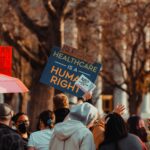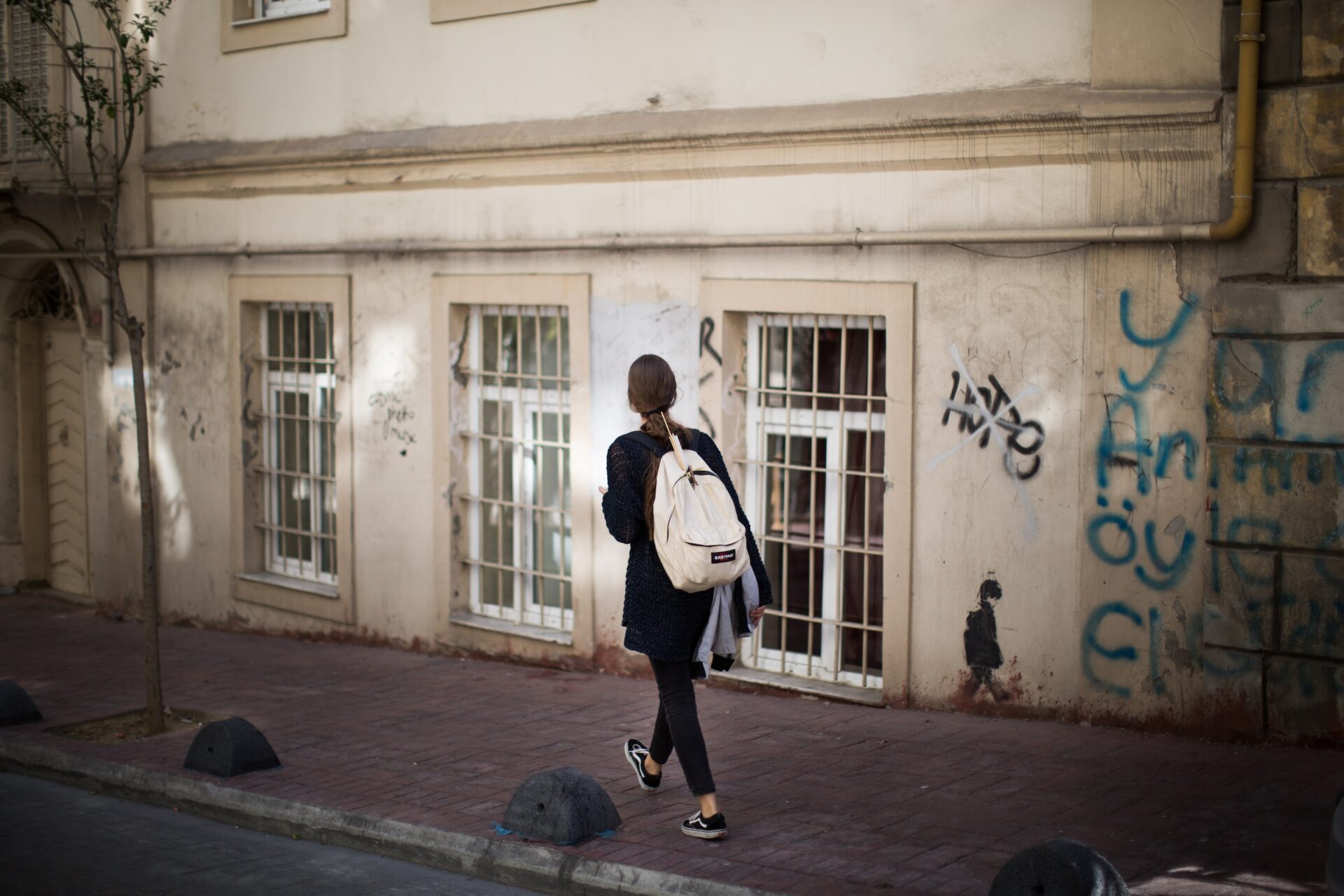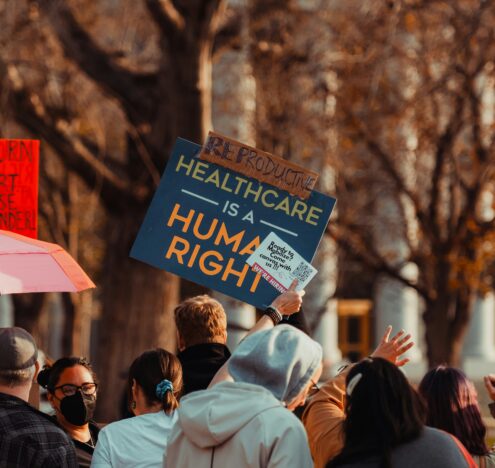In the days preceding the election, Istanbul’s public squares had turned into bustling fora for the country’s political parties that battled for votes in one of the most consequential elections in Turkey’s modern history. At night, motorcades roaming through the city’s streets and blasting campaign songs praising candidates would disturb the peace and quiet of residential neighborhoods. During the day, dozens of people, mostly men, could be seen standing in front of mosques debating politics and passionately defending their favorite candidates.
In a way, the campaign season in Turkey had turned into a national holiday in its own right, full of energy and mass mobilization across society, highlighting the special importance of this past election. It would be impossible to walk in the streets of Istanbul and not be approached by campaign workers or volunteers. The campaigning was everywhere, and Turkish society was fully engaged. It’s no surprise that Turkey recorded a very high voter turnout: 87.04% in the first round and 84.22% in the second round. This record turnout was another testament to the high-stakes nature of the 2023 elections.
The incumbent president, Recep Tayyip Erdoğan, who has ruled the country for the last two decades, won with 52.2% of the votes in the run-off with opposition leader Kemal Kılıçdaroğlu. He hailed his victory as that of “85 million Turks” while the opposition decried “the most unfair election in recent years.”
When asked to describe what his ideal Turkey would be, Emine said, “Freedom… a Turkey where everyone, irrespective of their identity, is free to live however they want and do what they want.”
For many, the political battle was real, and its outcome crucial for the trajectory of a country facing several crises, ranging from a ravaged economy, extreme polarization, and devastating earthquakes, to a crisis of democracy and human rights.
The inflection point was especially important for Turkey’s new generation, a youth that has known the rule of one strongman. A country with a relatively young population — those between the ages of 15 and 24 make up 15.3% of the country’s population as of 2021 — means that listening to the voices of young Turks is necessary to understand the challenges facing Turkey.
Hope For More Freedoms
“My friends and I really thought that this was the moment everything could change,” says Cemal, a university student and a Turkish immigrant living in California. His family has faced political persecution at home for years and was forced to relocate following the failed coup attempt against Erdoğan’s regime in July 2016. Cemal attended college in the United States but still maintains important connections to Turkey and, like many of his peers, is invested in the country’s domestic political developments.
In recent years, Erdoğan’s government has engaged in a campaign of widespread political persecution against opponents at home but also abroad, carrying out a massive transnational effort to stifle all opposition. Cemal is one of the several people with whom I spoke to understand how the new generation of Turks viewed the recent elections and their impact.
“This was about choosing between democracy and autocracy, one-man rule,” noted Furkan when asked why he thought the election was so important.
Furkan, a self-described Kemalist-nationalist who supported the opposition candidate Kılıçdaroğlu, is originally from Istanbul but studies in Kayseri, a more conservative city far from home. He expressed concern that the Turkish state was becoming “more Islamic” and that the state apparatus has been purged from more moderate and secular officials under Erdoğan.
His voice is reflective of a large portion of young Turks, who come from diverse ideological streams, including Western-oriented liberals, Muslims, nationalists, leftists, and more moderate Kemalists. Yet, the point of agreement among them, despite seemingly irreconcilable differences, is the desire for a return to a Kemalist Turkey and the foundational principles of the Republic. Many from Turkey’s new generation see it as a way to reclaim what they see as their lost rights and liberties and to put their country back on track to modernization and economic innovation.
“What we don’t want,” I was told by the students interviewed, “is to turn into Iran.”
Civil and political rights are the paramount concern for Emine, a student in Izmir, who said that the elections had affected him deeply. Emine was emotional and anxious speaking about the election even weeks after it was over. He had cried the night when he found out Kılıçdaroğlu had lost.
According to Emine, the government’s policies and the president’s rhetoric have deprived young people of their “sense of freedom,” while aggravating the situation for already marginalized or otherwise persecuted minorities in the country, specifically Kurds and non-Muslim minorities, as well as members of the LGBTQ community.
An Economy in Crisis
The state of the economy and the grim prospects for the future were another crucial concern that had motivated young voters to head to the polls. Erdoğan’s growth-oriented but idiosyncratic and unorthodox economic policies have become a disaster for the Turkish economy, resulting in unprecedented inflation and an outflux of foreign investors.
As Furkan described, “We [Turkey] tried to copy China’s economic model, but we have neither China’s population nor capacities or resources.”
After winning reelection, Erdoğan has made steps to reverse the fiscal and monetary policies that have resulted in a worsening economic crisis and high inflation. In a clear signal to show a return to conventional policy and attract foreign investors, he appointed Mehmet Şimşek as Turkey’s Treasury and Finance Minister. Şimşek is a respected figure who previously was the Deputy Prime Minister and is well-known for his market-friendly policies.
The post-election pessimism of young Turks about the future prospects in a country governed by a divisive and populist leader and worsening economic crisis is hardly surprising. A 2021 poll of Turkey’s youth showed that 62.5% would like to leave the country. Among the supporters of the ruling Justice and Development Party (or the AKP) the percentage of those wanting to emigrate was 47%, while 69% of young voters supporting the nationalist and conservative Nationalist Movement Party (or the MHP), expressed the desire to leave.
Turkey’s Generation Z, more liberal than older generations, is also increasingly opposed to the Islamist policies and religious conservatism propagated by the government.
The government’s Islamist turn is mainly explained by Erdoğan’s own personal background and religious and ideological convictions. Using populist rhetoric resembling former President Donald Trump’s, the Turkish president has cultivated the image of the marginalized, discriminated Muslim oppressed by “secular Kemalist elites” to gain and consolidate power throughout his political trajectory. His early steps in politics, in fact, were made through involvement with Islamist, anti-Western, and anti-Semitic parties.
The main tool that Erdoğan’s government has used to bring Islam back into the social fabric of Turkish society, as well as into politics, has been education. The Turkish state has poured huge financial resources into sponsoring religious Islamic schools and overhauling the public education system to turn the new generation of Turks away from what religious conservatives see as Western-driven modernity full of degeneracy, degradation, and values that are against the Turkish national identity.
These are the policies that I kept hearing from young Turks. In their view, these policies are driving Turkey backward, replacing hard-won progress in all aspects of life since the founding of the modern Turkish state with medieval thinking and outlook that can have a lasting impact.
To many, this is also a betrayal of Mustafa Kemal Atatürk, the revered founding father of modern Turkey. Building a new nation out of the ashes of the Ottoman Empire, Atatürk fought religious fundamentalism to enshrine secularism in the country’s founding, de-Islamized the country virtually in every aspect, and homogenized the society at the expense of ethnic minorities to create a strong Turkish identity rooted in nationalism, instead of Islam.
Emine is among those who denounce this betrayal, seeing the current policy’s objective as that of irreversibly replacing the foundational principles of the republic. Cemal, while a practicing Muslim, is among those who favor religious freedom for everyone in Turkey, including Christians, but is opposed to the kind of Islamization of the state apparatus pursued by the current government.
And despite the aggressive push of Islamization in public education and state propaganda, studies in recent years have shown that the Turkish youth has become more secular, more educated, more tolerant, and acquired more modern outlooks on life. The number of religious or Muslim youth has also dropped, with the youth resisting the state-mandated religious education aimed at achieving Erdoğan’s stated goal of “raising a pious generation.”
The main tool that Erdoğan’s government has used to bring Islam back into the social fabric of Turkish society, as well as into politics, has been through education.
Volkan Ertit, a scholar at Aksaray University who researches secularization in Turkey, attributes this evolution of Turkish youth contradicting the state vision to three components: urbanization, capitalism, and science — ingredients all present in modern-day Turkey.
Nowhere is this phenomenon more apparent than in the diverse metropolis that is today’s Istanbul. The country’s largest city, an opposition stronghold home to what can be seen as Turkish society’s most liberal population, with its modern lifestyle, historic neighborhoods, and an increasingly Euro-centric youth, exemplifies what Ertitt sees as the principal factor in explaining the declining piety and religiousness of a generation that is more liberal, modern, and connected globally than ever before.
Battling For Turkey’s Soul
Furkan recalls that many young people were previously uninterested in politics — also for safety reasons — but that in the weeks preceding the election, many had become more actively involved and showed increased interest in determining the future of their country.
And while the majority of Turkish youth may be opposed to the current regime, with pre-election polls showing only 20% of 18- to 25-year-old Turkish voters supporting Erdoğan and his ruling party, there are also many who still support Erdoğan, particularly in conservative and rural areas of the country where the president finds the majority of his support base.
Mehmet, a 21-year-old from Istanbul who voted for Erdoğan, agreed that the government may have made mistakes in its economic policy, but said that he believed in Erdoğan’s ability to lead through the challenging times. Mehmet also approves of the more muscular foreign policy Turkey has been pursuing.
Exiled Turkish journalist Bülent Keneş believes that Turkey’s problems are more systemic and foundational and not simply the result of Erdoğan’s pursuit of his own agenda. In Keneş’s view, there is not enough genuine demand for democracy and the rule of law in Turkey. In fact, the opposite is true, and according to him, there is a “political environment where the unlimited supply of Islamist, nationalist, racist and far-right populist rhetoric, and the higher demand for it among the majority of people, is increasing day by day, making it more difficult to back liberal democratic values, norms, and institutions.
Young people are increasingly tired of the system in place and tend to generally embrace the concept of democratization based on Kemalist, secular principles. Some, such as Emine and Furkan, would even like, with some reservations, Turkey to be part of the European Union if such a scenario were politically feasible.
When asked to describe what his ideal Turkey would be, Emine said, “Freedom… a Turkey where everyone, irrespective of their identity, is free to live however they want and do what they want.”
It remains to be seen whether Erdoğan’s new term will allow the seeds of much-desired freedom to grow in a country where most of the youth are not optimistic at all about what the future holds. As the Turkish saying goes, “sakla samanı, gelir zamanı” — “save the hay, and its time will come.”
Author’s note: For the safety and anonymity of the interviewees who agreed to discuss their opinions and experiences, their names have been changed, and personal information that could potentially expose their identity, including their names, has been hidden or altered.





















